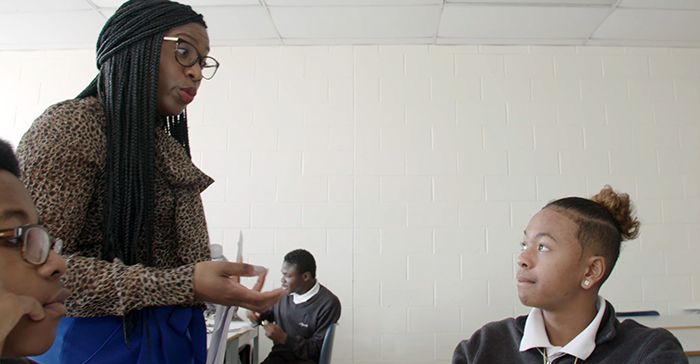Respect
Everyone is welcome in Ms. Duke’s class.
As the head of the English department at St. Marguerite d’Youville Secondary School in Brampton, Tia Duke has become a champion of the Black Voices literature program. Under her watch, it has turned into one of the school’s most popular courses, giving her students a chance to study works like Things Fall Apart, The Book of Negroes and The Color Purple. Duke works to honour the diversity of her student group, in everything from what they read to where they come from to how they learn. It’s all about creating space for every type of student.
St. Marguerite d'Youville is very diverse, and the school has really embraced that diversity: the courses that are offered are very creative. Students need options. And it's important that we incorporate that in meaningful ways. Black literature isn’t something you study once a year. It’s the curriculum we teach. To me, success would be no longer having cycles where diversity is the hot topic. I want students to sit in a class and read diverse texts from around the world, and have conversations about those people’s real experiences, all as part of a normal school day.
I think fear is what prevents us from progress. I know that some of the conversations I have with students will make them uncomfortable. But that’s the whole point of education! I want to reach a place where we can have open discussions without being fearful. Be open to changing your lens; the rest will follow.

For me, this came from the fact I didn’t really have any black teachers growing up. I can’t say I didn’t have amazing teachers, some amazing mentors, but there is something important about seeing yourself reflected in your school community. I want my students to see their experiences reflected in their educators as much as their literature. And I think it’s important for all the students to see that anyone can be a teacher.
When we talk about diversity and being inclusive, I think part of that is recognizing that students are coming here with a whole host of challenges, and a one-size-fits-all approach is not going to work. We have to pay attention to them and support them in unique ways, so they can leave here whole, healthy people.
I do think faith helps. If you look at it from the stance that we are supposed to be people that are inclusive and caring and we see that through Christ’s example. We forget that Jesus pushed the status quo. It’s easy for us in positions of privilege to be comfortable. Jesus challenged that comfort – he included all sorts of people who were considered ‘outsiders.’ And by doing that he challenges us to include those who are marginalized or oppressed. Catholicism asks us ‘how we can do better and be better?’ And as educators, we should be doing that, whether it’s a social justice piece or just recognizing that we are all God’s children.